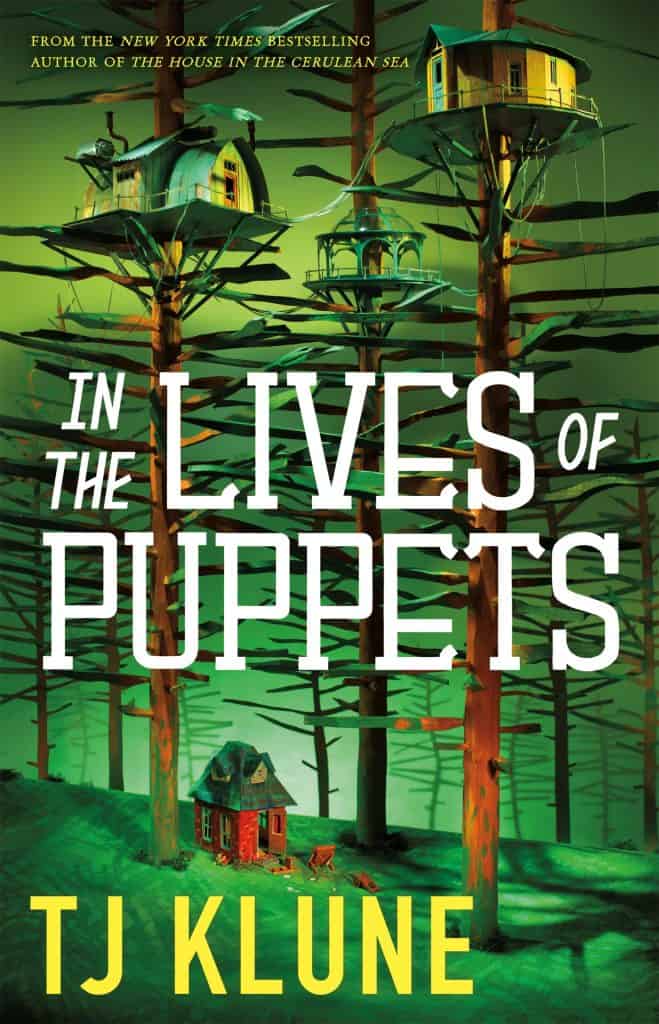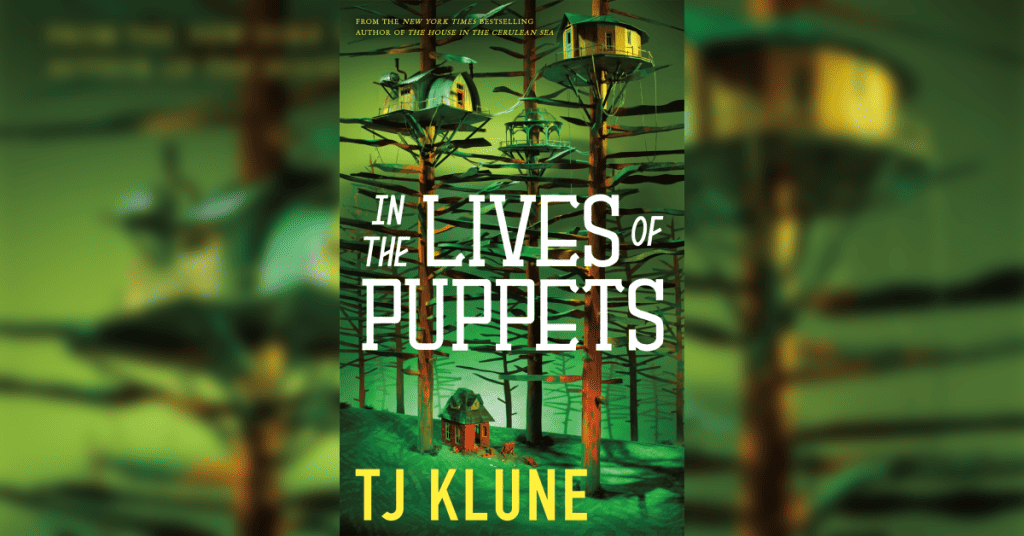Pinocchio’s had a bit of a resurgence as of late. After all, last year saw no less than three film adaptations, including Guillermo del Toro’s Oscar-winning animated film. And now, T.J. Klune offers his own adaptation with In the Lives of Puppets. Mashing the basic story of Pinocchio with a post-apocalyptic android future, In the Lives of Puppets does everything a good Pinocchio story should. It explores innocence in a world of darkness, the idea of found families, and most importantly – what makes us human. It’s a heartwarming story of a vacuum, a nurse droid, a murder droid, and their squishy, human friend. If you’ve ever read a T.J. Klune book, you know exactly what vibes to expect – though you might not get everything you’re used to here. And if you’re new to his work, buckle up and prepare for a joyous ride.
A Familiar Story with a New Twist
Gio, inventor and android prodigy, lives a quiet life in the forest, far away from the City of Electric Dreams and the Authority that rules it. By his side are his human son, Vic, and the robots Vic has salvaged from a local scrap yard – Rambo, the neurotic vacuum cleaner, and Nurse Ratched, the sociopathic medical droid. The group lives a life of relative solitude. Until Vic discovers the remains of the murderous android, HAP. In trying to repair Hap, Vic accidentally alerts the Authority of his existence and brings their wrath upon his entire family. After the Authority captures Gio, forcing him to return to the city and continue his work, Vic and his friends embark on a journey into the belly of the metaphorical (and literal) whale to rescue him. It’s a journey that takes them far from their idyllic lifestyle and deep into a dystopian, cyberpunk nightmare.
In the Lives of Puppets takes the basic premise of Pinocchio and twists it into something new. Klune hits every one of the classic story’s main plot points – the lonely inventor, the curious invention, the traveling circus man, a Blue Fairy, the den of sin, and even the belly of the whale. It’s a story of self-discovery, a story about finding the humanity within ourselves. Like any good Pinocchio retelling, it looks for the lightness within a world of darkness. And it’s a genuinely warm, romantic, and enjoyable read. But it’s also my least favorite of Klune’s books. Here, Klune’s trademark warmth never fully meshes with the surprisingly dark world he creates. So, instead of getting a very cozy, romantic slice of fantasy, you get a hodgepodge of tones that fail to coalesce into a cohesive whole.
Coziness vs Darkness
In the Lives of Puppets is a book defined by its incongruities. On the one hand, it delivers every ounce of Klune’s trademark coziness that you could possibly want. But on the flip side, Klune populates it with so much darkness, a dystopian world filled with fascistic robots and literal genocide, that all of that lighthearted warmth feels jarring. It’s a book caught between the warmer demands of its characters and the darker demands of its plot. And because of that clash, the book just doesn’t work as well as it could. To be clear, I’m not suggesting I want the book to be darker than it is. Quite the opposite. I don’t think any of us are reading a T.J. Klune book in search of some grimdark exploration of humanity’s pitfalls or anything. The issue is that the plot Klune sets up kind of demands such an exploration.
Without venturing too far into spoilers, Klune reveals some devastatingly dark details about both the characters and the larger world of the novel. And rather than fully exploring the ramifications of all of this darkness, and allowing Vic to really grapple with such meaty ideas, Klune kind of handwaves it all away, settling on the very wishy-washy notion of forgiving but not forgetting. It feels like the book is too scared to fully follow its own ideas to their most natural conclusions. It asks a lot of meaty questions, as any piece of science fiction should. But it feels like it’s too afraid to offer any real answers to those questions. Overall, it feels like In the Lives of Puppets wants to be both darker than Klune’s previous books and exactly as warm and comforting as them. Instead, it should’ve settled on something in between.
A Deeply Enjoyable Read Nonetheless
With all of that said, though, In the Lives of Puppets works far more often than it doesn’t. Honestly, it’s hard to walk away from a T.J. Klune book without liking some aspect of it. And there’s so much here to like. There’s the lovable group of characters, all of whom adhere to many of the archetypes found in Pinocchio while still feeling startlingly original, wholly formed, and devastatingly human. There’s a genuinely touching love story – even if it often fades into the background. The plot itself ends up being this delightful, Pinocchio meets Wizard of Oz kind of quest. And the worldbuilding is just so all-encompassing, and so deeply interesting. In both The House in the Cerulean Sea and Under the Whispering Door, the worldbuilding felt like an afterthought to the story Klune was actually telling. But that’s not the case here.
Here, the implications of everything that’s happening in the novel’s world directly inform the journey the characters take. Without the fascistic robotic government, none of the novel’s events happen. And while Klune never fully finds a way of marrying the darkness of his worldbuilding with the warmth and lightness of his character work, each of these elements contributes to the novel’s enjoyability – and originality. Sure, there are tons of science-fiction stories that explore robot apocalypses, ones that do a far better job of delving into the larger questions that such a narrative asks. But In the Lives of Puppets finds enjoyment in the smaller moments. In the ways Klune plays with the Pinocchio narrative, twisting and turning it to transform it into this cyberpunk nightmare. And those smaller moments make for a genuinely enjoyable read.
Final Thoughts
At the end of the day, In the Lives of Puppets is a bit of a mixed bag. On the one hand, it’s an absolute page-turner. Compulsively readable, filled with a host of lovable characters and compelling ideas – even if they aren’t fully explored. On the other hand, it’s a mishmash of tones that never fully coalesces into a satisfying whole. That being said, for all its faults, In the Lives of Puppets never fails to be deeply entertaining – even if it takes a bit of time to really get started. I appreciate that Klune tries something different here, even if it doesn’t fully work. He takes some big swings here, and those swings are interesting enough to bridge the gap between what works and what doesn’t.
If you’ve ever read a T.J. Klune book, you know exactly what to expect – and you’re gonna get it. If you’re new to his work, I genuinely think In the Lives of Puppets is a great place to start.
In the Lives of Puppets is available in Hardcover, eBook, and Audiobook formats from Tor Books/Macmillan.

DISCLAIMER: A review copy of In the Lives of Puppets was provided by the publisher. All opinions in this review are the honest reactions of the author.
While its contrasting tones never fully coalesce into a satisfying whole, T.J. Klune's "In the Lives of Puppets" offers a cozy, warm retelling of a very familiar story with a surprisingly dark undercurrent. It's a compulsive page-turner, filled with lovable characters and delightfully compelling ideas - even if they're explored to their fullest.
-
GVN Rating 7.5
-
User Ratings (0 Votes)
0







